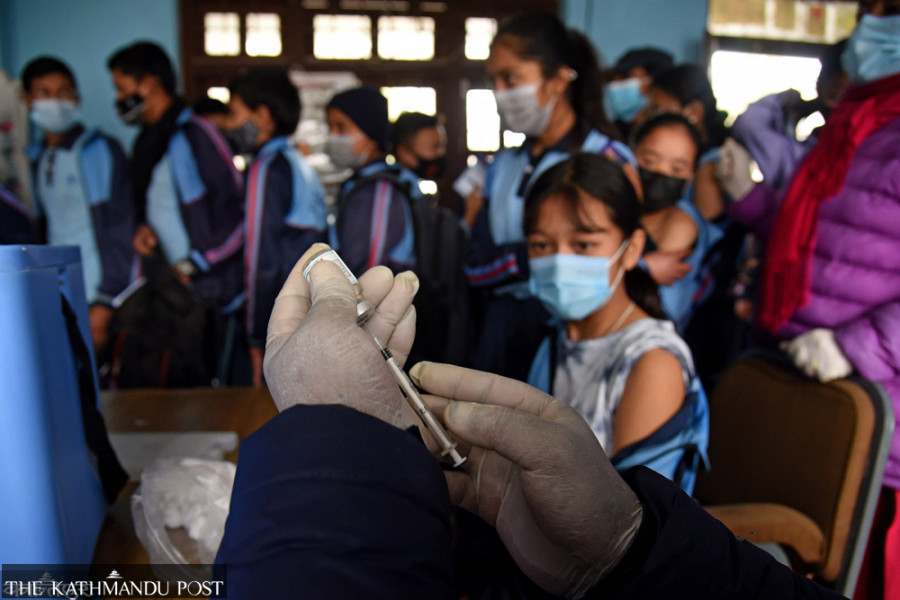Health
Nepal buying jabs for kids despite sub-par results
The government is preparing to purchase 8.4 million doses of Pfizer, the only vaccine approved by WHO for children aged 5 to 11 years.
Arjun Poudel
Nepal has yet to vaccinate children aged between five and eleven years against Covid-19. As the pandemic risk is not completely over, the government is planning to procure 8.4 million doses of the Pfizer-BioNTech vaccine to inoculate the children in this age group. But if some reports are anything to go by, there could be a setback.
According to a large data collected by US’ New York state health officials, the Pfizer-BioNTech Covid-19 vaccine is less effective in children aged between five and eleven than in adolescents and adults.
“The Pfizer-BioNTech vaccine is the only jab recommended by the World Health Organisation for use in children between five and eleven,” said Dr Roshan Pokhrel, secretary at the Health Ministry. “We will not stop the process to procure the vaccine unless the World Health Organisation’s Strategic Advisory Group of Experts on Immunisation recommends otherwise, as there is no other vaccine for children of a smaller age group.”
In the study released recently, six New York state public health scientists analysed cases and hospitalisation rates from December 13, 2021 to January 30, 2022 among 852,384 fully vaccinated children aged 12 to 17 and 365,502 fully vaccinated children aged five to eleven.
Vaccine effectiveness against testing positive declined from 66 percent to 51 percent among children aged 12 to 17. In the younger group, effectiveness dropped from 68 percent to 12 percent.
The study was carried out during the Omicron variant surge but was made public at a time of rapidly dropping cases and hospitalisations in New York and elsewhere.
Officials at the Department of Health services said they have already forwarded a proposal for procuring the vaccine to the Health Ministry, which will take it to the Cabinet.
“Once the Cabinet okays the proposal, a deal to purchase the vaccine will be signed,” said Dr Surendra Chaurasia, chief of the Logistic Management Section under the Department of Health Services. “‘We are in the final stage to purchase the vaccine for children between five and eleven.”
Last month, the Health Ministry had signed a non-disclosure agreement to purchase Pfizer-BioNTech Covid vaccine for children of this age group.
“The deal is almost done, we are in the final stage,” Dr Dipendra Raman Singh, director general at the Department of Health Services, had told the Post on February 27. “We are working to bring the vaccine at the earliest.”
To purchase Covid vaccines, the government also signed an agreement for a concessional loan of $18 million with the World Bank on Friday.
The department has also sought emergency use authorisation for the Pfizer-BioNTech vaccine for children in Nepal with the Department of Drug Administration.
There are two types of Pfizer-BioNTech Covid vaccines for children– one is for those between five to 11 years, and another for those aged 12 and above.
The department has already provided emergency use authorisation for the Pfizer-BioNTech vaccine for adults. Nepal has already used Pfizer vaccines on its people—on those with comorbidities and on children between 12 and 17 years.
The American Association of Pediatrics has recommended administering 10 microgram doses in a gap of 21 days to children between five and 11 years. The dose, 0.2ml, is one-third of what is administered to adolescents and adults.
The vaccine vial for children in the said age bracket comes with an orange cap while the other vial is purple-capped.
Each vial with 10 doses needs 1.3 millilitres (ml) of diluent under Pfizer’s preliminary plan. The vaccines can be stored for six months in an ultra-cold freezer or 10 weeks in a normal refrigerator, under Pfizer’s proposal.
The US Food and Drug Administration in October authorised the emergency use of Pfizer-BioNTech Covid-19 vaccine for children between five and 11 years. Several countries have already started administering the vaccine to the children of the said age group.
Experts say that vaccination is the only proven intervention to lessen the severity and deaths from Covid-19 infection, now and in future.
Nepal received 664,560 doses of the Pfizer-BioNTech vaccine in December and 100,620 doses in October, donated by the United States through the COVAX facility, a United Nations-backed international vaccine-sharing scheme.
Earlier, the government had planned to purchase 6 million doses of 0.3ml type of Pfizer vaccine for people above 12 years but after sufficient doses of the vaccine arrived from various sources, authorities put the deal on hold and decided to purchase the doses for children between five and 11 years instead.
So far, 17,648,060 people have been fully vaccinated against Covid-19.




 11.84°C Kathmandu
11.84°C Kathmandu















